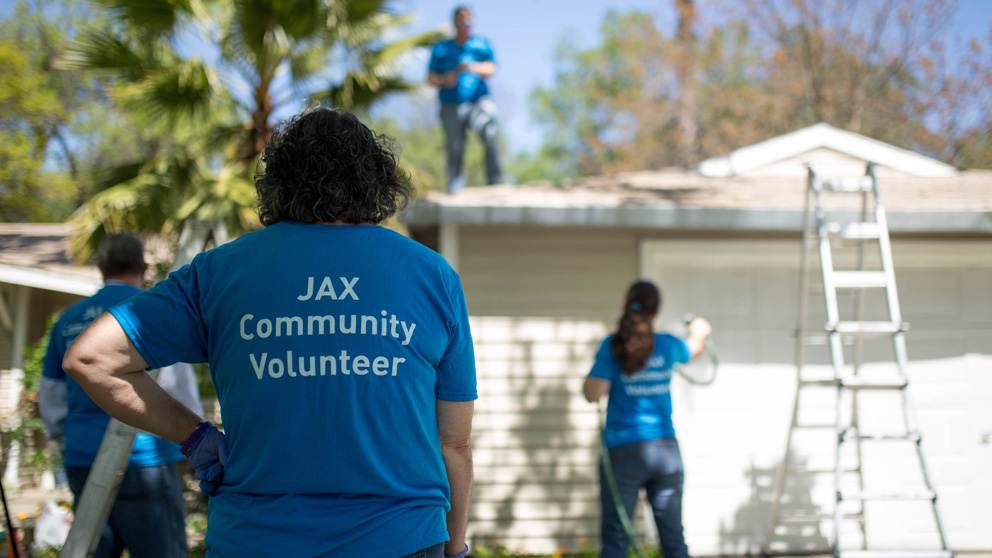
For two days this spring, 130 employees and volunteers affiliated with The Jackson Laboratory (JAX) completed projects to help families impacted by Alzheimer’s disease in Maine, Connecticut, and California. Alzheimer’s disease, which affects approximately five million Americans, is one of the focus areas for the nonprofit biomedical research institution.
JAX scientists are harnessing powerful genomic technologies to uncover the complex causes of Alzheimer’s disease. The Laboratory is studying the genetic factors that protect brains from Alzheimer’s, along with how lifestyle impacts onset of the disease, with the goal of Breaking the bottleneck in Alzheimer's drug developmentFor the first time, researchers have the tools to build new mouse models that truly represent patients with Alzheimer’s disease. turning that knowledge into new therapeutics .
In collaboration with the Alzheimer’s Association Maine, Connecticut and Northern California chapters, the JAX team is building upon its promising research to reach another population impacted by Alzheimer’s disease: caregivers.
In Maine, 60 volunteers created care packages to help make Alzheimer’s caregivers — who often spend much of their daily lives focused on helping their family members — feel pampered. Volunteers also helped with spring cleanup projects in Bangor and Ellsworth.
In Connecticut and California, 34 volunteers and 36 volunteers, respectively, spearheaded spring cleanups for families around the states. They raked yards, prepared soil for spring gardens, cleaned windows, and did a variety of other outdoor chores, allowing caregivers to take these tasks off their “to do” lists.
“Alzheimer’s disease impacts so many more people than just the one diagnosed — spouses become full-time caregivers, children become medical advocates — this truly is a family disease, and we are honored to have the chance to help our friends and neighbors in this way,” said Clare Tully, senior director, HR, Health & Safety at JAX.
In related news, the Laboratory recently announced that JAX neuroscientist was appointed to a new Catherine Kaczorowski appointed to new Evnin Family Endowed Chair in Alzheimer's ResearchJudith and Anthony Evnin, Ph.D., are giving $1.5 million to JAX to establish the Evnin Family Endowed Chair in Alzheimer’s Research. Catherine Kaczorowski, Ph.D., a JAX neuroscientist who is taking a bold approach to combat Alzheimer’s, has been appointed chairholder. endowed chair in Alzheimer’s research , and the nonprofit has continued to receive prestigious research grants, including a $25M grant from the National Institute on Aging to JAX researchers Gareth Howell, Ph.D.Applies genetics and genomics approaches to study age-related neurodegeneration associated with Alzheimer’s disease, dementia and glaucoma.Gareth Howell, Ph.D. and Gregory Carter, Ph.D.Develops computational strategies using genetic data to understand complex genetic systems involving multiple genes and environmental factors.Greg Carter, Ph.D. to form an Alzheimer’s Disease Center at JAX and Indiana University.
About The Jackson Laboratory
The Jackson Laboratory is an independent, nonprofit biomedical research institution based in Bar Harbor, Maine, with a National Cancer Institute-designated Cancer Center, a facility in Sacramento, Calif., and a genomic medicine institute in Farmington, Conn. It employs 2,100 staff, and its mission is to discover precise genomic solutions for disease and empower the global biomedical community in the shared quest to improve human health.













